Chile declares disaster in quake-hit regions
- Published
CCTV from inside a supermarket when the tremors struck has been released
Chile has declared two northern regions hit by a magnitude 8.2 earthquake to be disaster areas.
At least six people are known to have died and tens of thousands of people have been evacuated.
The quake struck at 20:46 local time (23:46 GMT) about 86km (52 miles) north-west of the mining area of Iquique, the US Geological Survey said.
Police are searching for hundreds of inmates who escaped from a women's prison in Iquique.
The interior minister told Chilean TV that some 300 inmates had escaped but officials later said that 26 had been recaptured.
Waves of up to 2.1m (about 6ft) have hit some areas and there have been power cuts, fires and landslides.
Dozens of aftershocks have been reported throughout the night, including a 6.2 tremor.
The government said the declaration of a disaster in the regions of Tarapaca, Arica and Parinacota was aimed at "avoiding instances of looting and disorder".
President Michelle Bachelet said the country had "faced the emergency well" and called on those in affected regions "to keep calm and follow instructions from the authorities".
She is due to visit the affected areas later on Wednesday.
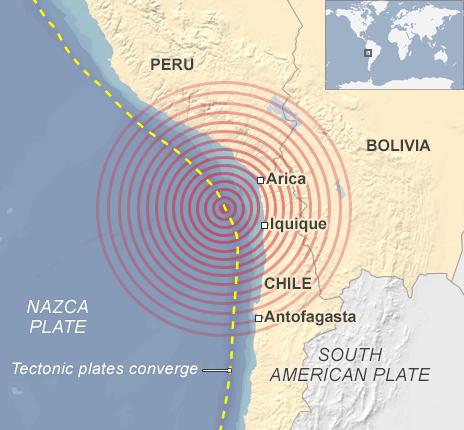
Prison break
Chilean TV broadcast pictures of traffic jams as people tried to head for safer areas.
Officials said the dead included people who were crushed by collapsing walls or died of heart attacks.
The interior minister also told Chilean TV that some 300 women inmates had escaped from a prison in Iquique.
Officials later said that 26 of them had been recaptured.
Authorities say they have re-established electricity supply in 50% of the affected areas.
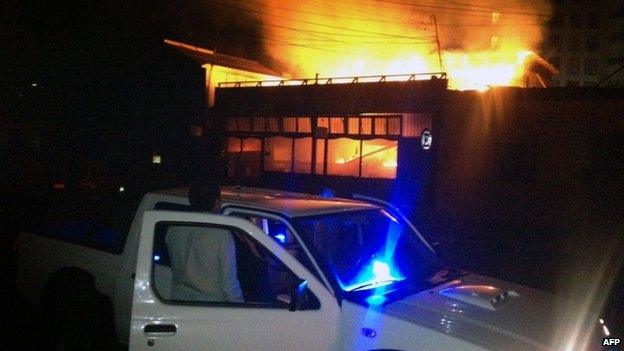
A fire broke out at a restaurant on the shore at Iquique
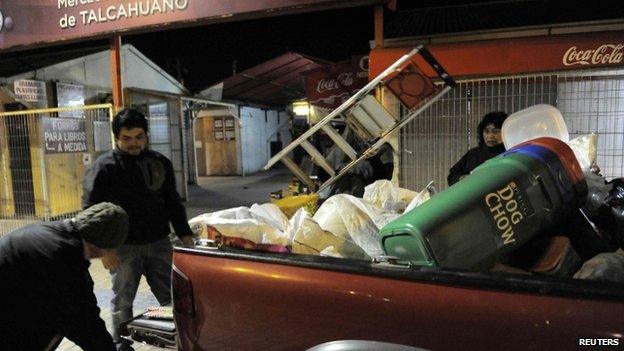
Chileans on the coast evacuated to higher ground
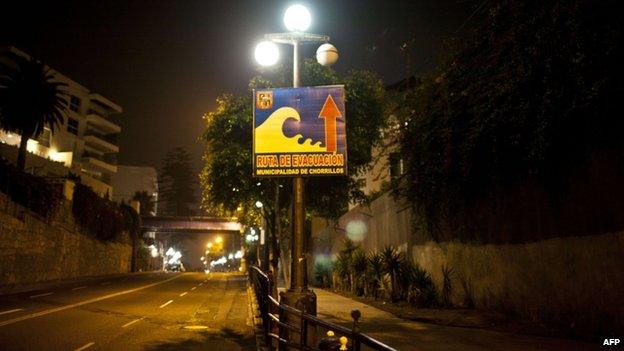
Streets across Peru and Chile were deserted following the tsunami alert
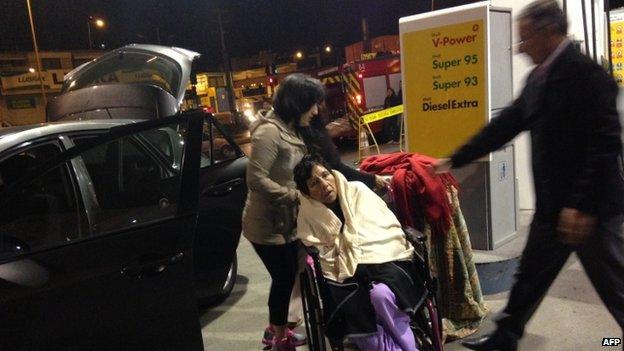
Hundreds of thousands of Chileans are spending the night away from their beds because of the evacuation order
Iquique Governor Gonzalo Prieto told local media that in addition to those who died, several people had been seriously injured.
While the government said it had no reports of significant damage to coastal areas, a number of homes were reported destroyed in Arica.
The quake shook buildings in Peru and in Bolivia's high altitude capital of La Paz - more than 470km (290 miles) from Iquique.
The Chilean interior ministry told the BBC that one of the main roads outside Iquique was cut off because of hillside debris.
Partial landslides have also taken place between the towns of Putre and General Lagos.
The authorities are reported to have deployed a planeload of special forces to guard against looting.
The Pacific Tsunami Warning Center, external (TWC) issued an initial warning for Chile, Peru, Ecuador, Colombia and Panama.
However, all warnings, watches and alerts were later lifted except for Chile and Peru.
Tsunami watches - in which the danger of large waves is deemed to be less serious - had been in place for Costa Rica, Nicaragua, El Salvador, Guatemala, Mexico and Honduras.
"We have asked citizens to evacuate the entire coast," Chilean home office minister Mahmud Aleuy said.
Evacuations were also ordered in Peru, where waves 2m (6.5ft) above normal forced about 200 people to leave the seaside town of Boca del Rio near the Chilean border, police said.
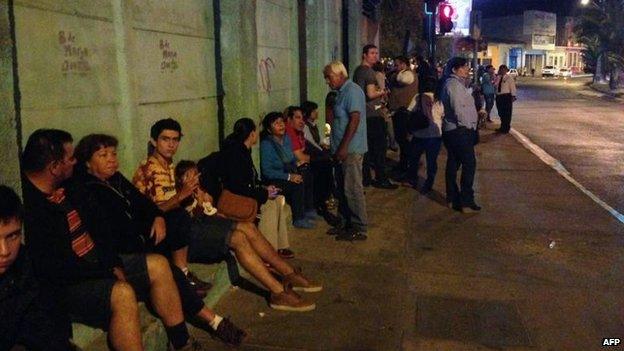
People take refuge in the Chilean coastal city of Antofagasta
'Ghost town'
A British expatriate near the northern Chilean city of Antofagasta told the BBC that there had been several tremors since the last quarter of last year.
"But this earthquake, even with the increased distance, seemed to last a lot longer," Patrick Moore said.
"I knew it was bad so I immediately went online to see what had happened, and saw a tsunami warning that's been put in place which confirmed my fears that it was a big one."
President Michelle Bachelet urged people to "do all they need to ensure they and their families stay safe"
Kurt Hertrampf, a hostel owner in Arica, told the BBC there had been a blackout in the town after the quake and he was surprised the telephone line was still working. He added: "Downtown looks like a ghost town."
The area close to the epicentre is mineral rich, but none of the major copper companies reported any break in production.
Chile is one of the most seismically active countries in the world.
Central and southern areas of the country were hit by a powerful earthquake of magnitude 8.8 followed by a tsunami that devastated scores of towns in February 2010. More than 700 people were killed.
In 1960 an area of Chile south of Concepcion was hit by a 9.5 magnitude which caused about 1,655 deaths and a tsunami in Hawaii and Japan.
A 9.0 magnitude quake that struck Japan on 11 March 2011 caused a devastating tsunami and left more than 15,000 people dead, with more than 3,200 missing.
Are you affected by the earthquake? Are you in the region where a tsunami warning has been put in place? Please email haveyoursay@bbc.co.uk with 'Chile' in the subject.